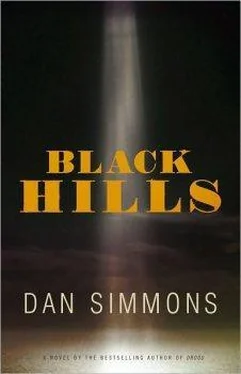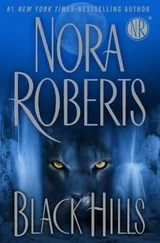Paha Sapa had frowned and stared at the top of Robert’s lowered head until his son looked up.
— Let’s be serious about this, Robert.
Robert’s eyes—his mother’s eyes—were as darkly serious as Rain’s had been when she was saying something very important to Paha Sapa.
— I am serious , Ate… Atewaye Ki. I want to become as good a man as you have always been. Mitakuye oyasin! All my relatives!
So Robert had accepted the offer from Dartmouth in New Hampshire and had finished his motorcycle and gone on long rides down prairie dirt and gravel roads every day—and often in the moonlight—and then on April 6, one month and a day after his second inaugural, President Wilson, who had been reelected for promising to keep the United States out of the European war, went to Congress and asked for a declaration of war against the central powers of Germany, Hungary, Turkey, and Bulgaria.
Five weeks after that, Paha Sapa came home from a twelve-hour shift at the Homestake to find his son standing in the kitchen and wearing the dark khaki uniform, the high puttees, and the flat-brimmed Montana peak hat of the American Expeditionary Force. Robert calmly explained that he’d driven the few miles to Wyoming to enlist as a private in the Army, in the 91st Division and would be leaving the next day for basic training at Camp Lewis in Washington state.
Paha Sapa had never touched his son in anger. While all the white fathers he knew spanked their kids, especially their boys, whenever they got out of line, Paha Sapa had never raised a hand to Robert and almost never raised his voice. A look or slight lowering of his tone had always sufficed in terms of discipline and he had never been tempted to spank or strike his son.
That moment, in the kitchen in the shack in Keystone on May 8, 1917, was the closest he ever came to striking Robert—and it would have been no token slap: Paha Sapa would have pummeled Robert with his fists, beating him into submission as he later beat the bullies on Mount Rushmore who insisted on picking fights with him, if he hadn’t forced himself to sit down at the kitchen table instead. He was so furious he was shaking.
— Why, Robert? College? Dartmouth? Your future? Your mother’s hopes for you, Robert. My hopes. Why in God’s name?
Robert had also been shaking with emotion, although which emotion—embarrassment, fear at his father’s potential wrath, excitement, chagrin, nervousness—Paha Sapa would never know. He only saw the trembling of his son’s always calm hands and heard the slightest hint of tremolo in the always calm voice.
— I have to, Father. My country’s at war.
— Your country!?
Paha Sapa felt like jumping to his feet then and seizing his much taller son by the front of his oversized service coat, ripping the buttons off, and throwing the eighteen-year-old through the closed screen door.
But all he could do was to say again in a strangled rasp—
— Your country!?
He felt then that he had failed completely in showing his son Bear Butte and the Badlands and the Paha Sapa themselves, the Six Grandfathers in the sunlight, the forests of aspen and ponderosa pine, the valley meadows and grassy hills farther south and the plains where the wind became a visible thing moving its invisible hand across the hide of the world. He realized, too late, that he should have taken Robert to the valley of the stream called Chankpe Opi Wakpala , where the scattered bones of Paha Sapa’s beloved tunkašila lay bleaching beneath an ancient cottonwood tree and where Crazy Horse’s heart had been secretly buried so that no wasichu could ever disturb it.
All he could say, for the third and final time, was—
— Your … country?
Robert de Plachette Slow Horse had not cried, to his father’s knowledge, since he was one and a half years old, but he looked as if he was going to cry now.
— My country, Father. And yours. We’re at war.
Paha Sapa came very close to being physically ill. He gripped the edge of the kitchen table with all his strength.
— It’s a war between a wasichu kaiser and a wasichu king, Robert, with lots of other wasichu parliaments and prime ministers and foul-breathed old men speaking a score of languages all swept up in it. For no reason. For no reason. Do you know how many young English boys died at the Battle of the Somme, Robert… on just the first day?
— More than nineteen thousand dead, Father… before breakfast that first day. More than fifty-seven thousand casualties that entire first day. More than four hundred thousand soldiers from the British Empire dead or injured before the battle was over, more than two hundred thousand French casualties—and it wasn’t their battle—more than four hundred and sixty thousand German casualties.
— More than a million men dead or wounded in one battle, Robert… for what? What was gained by either side when that battle was over?
— Nothing, Father.
— And you’re volunteering for that? To join that absolute… madness.
— Yes. I have to. My country’s at war.
He sat down across from his father and leaned across the table.
— Father, do you remember when I was about five and you took me to Bear Butte for the first time?
Paha Sapa could only stare sickly at his son.
— Do you remember that I disappeared for several hours and all that I’d tell you when I came back to our campsite was that I’d been with a nice man who had the same name as I did? Robert Sweet Medicine—you also met him. I know you did.
Paha Sapa could not even nod or shake his head. He looked at his son as if he were already in the grave.
— Well, I told Mr. Sweet Medicine that I’d never repeat the things he told me that day, Father, but I’ll break that promise and tell you this…. He told me that I was not destined to die a warrior’s death. That I would never die on a battlefield or from another warrior’s hand. Does that make you feel better, Father?
Paha Sapa grasped his son’s wrist so hard the bones groaned.
— Why, Robert? Dartmouth? Your real life ahead of you? Why… this?
Robert looked down a moment and then met his father’s gaze.
— A couple of months ago when we were working on the Harley, you asked me what I wanted to do… with my life. I didn’t answer. I’ve been afraid for years to tell you the truth. But I’ve known for years what I want to do , must do…. I want to be a writer.
The words made no real sense to Paha Sapa. All he could see was the campaign hat, now laid on the table, the black eagle with the spread-wings buttons on the coat, and the bronze disks on the high khaki collar of the uniform jacket—the disk on the left with the embossed letters U.S. and the disk on the right showing the crossed rifles of the infantry.
— A writer? Do you mean like a journalist? A newspaperman?
— No, Father. A novelist. You love to read…. You read novels all the time. I learned my love of books and of Dickens and of Cervantes and of Mark Twain and of all the others from you, Father. You know that. I’m sure that Mother would have led me to books in the same way; she was a teacher, I know, but she wasn’t there and you were. I want to be a writer… a novelist… but to write about something, I have to have lived. This war, this so-called War to End All Wars, as obscene as it is—and I know it’s obscene, Father, just as you do: I know it has no more glory in it than a terrible train wreck or auto accident… but it will be the major event of this century, Father. You know that. How will I ever know who I am or what I’m made of or how I’ll react under fire—perhaps I’m a coward, I have no idea now—but how will I know any of these things or learn about myself unless I go? I have to go. I love you, Father—I love you beyond all words in any language I know or could ever learn—but I have to do this thing. And I swear to you on everything sacred to both of us—on Mother’s grave and the memory of her love for both of us—that I will not fall in battle.
Читать дальше












